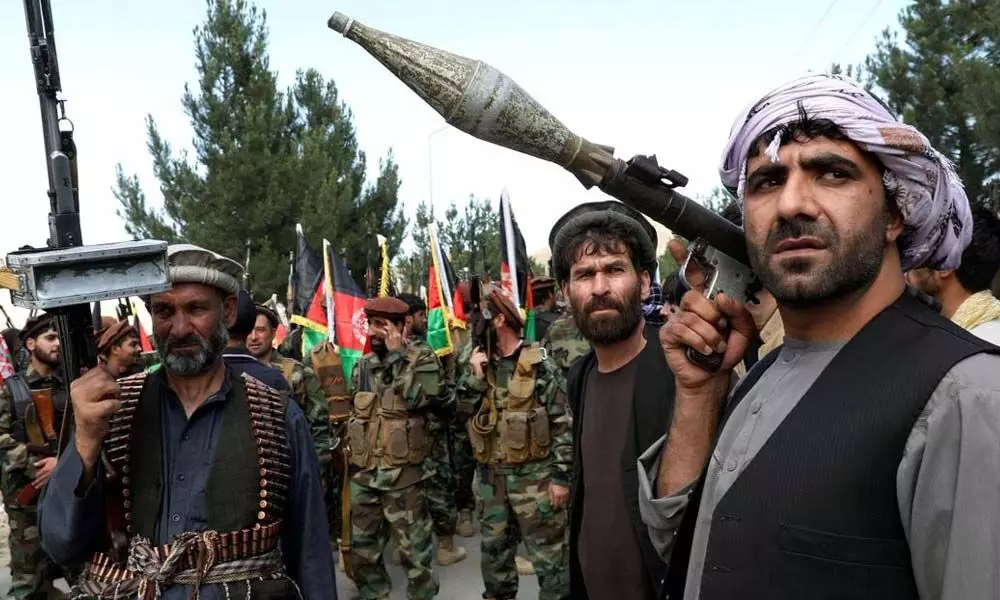Is civil war likely? The warlords will decide
In a country saturated with conflict for almost 50 years, it will be foolhardy to wave off the prospect of a battle for power. But for now the Taliban has space because its foes, actual or potential, are scattered, battered, divided or ready to make deals
image for illustrative purpose

UNSURPRISINGLY, the Taliban's rapid takeover of power across Afghanistan has prompted headlines about a renewed "civil war". This is misleading, however. "Civil war" implies a situation where an insurgent movement is taking on a ruling government. But in 2001, it was not just the US-backed Northern Alliance that removed the Taliban from Kabul – other local commanders and political leaders were challenging their authority too.
And in 2021, the Taliban swept to power by offering local groups incentives to cooperate or persuading them to stand aside. Now that the Taliban try to establish a government and ruling institutions, it is possible that these groups may resist being co-opted. They may bristle at a lack of autonomy, or see political and economic benefit in opposition to the new system in Kabul. Yet none of these groups has the national reach of the Taliban. And unlike 2001, none has outside support to do more than to hold on to their patch of Afghanistan. So for the foreseeable future, Afghanistan continues in its limbo.
The Taliban will be on uncertain ground as they declare legitimacy, but no pretender to Afghanistan's troubled throne is likely to offer a national alternative. Islamic State Khorasan Paradoxically, as Islamic State Khorasan (ISIS-K) has garnered attention for its mass killings outside Hamid Karzai International Airport on August 26, it has only exposed that, while it is a deadly irritant, it is not yet a threat to the Taliban's power. With an estimated 4,000 to 5,000 members, ISIS-K is still a local faction in eastern Afghanistan, mainly in Nangahar and Kunar provinces on the Pakistan border.
It may hope to build capacity through recruitment, exploiting the publicity of its high-profile attacks. But in contrast to the much larger Islamic State in Iraq and Syria, its capacity is for attacks on specific civilian sites rather than directly confronting national security forces or the political system as a whole. There is as yet no evidence that it has the institutional presence in villages that sustained the Taliban between 2001 and 2021. Nor are Pakistani services likely to risk their links with the Taliban by offering sustenance to a rival. Panjshir Valley and the north Reports are still emerging that the Taliban has "taken" the Panjshir Valley in north-eastern Afghanistan.
Images of the Taliban flag being raised in Panjshir's provincial capital, Bazarak, would appear to give them weight. The mainly Tajik resistance has been led by Ahmad Massoud, son of renowned warlord Ahmad Shah Massoud, and Amrullah Saleh, vice president in the ousted government. In the absence of any significant foreign support, Massoud's resistance has been concentrating on maintaining the region's autonomy and holding out against any Taliban attacks. He has offered negotiations with a view to a live-and-let-live arrangement, but already the tactic may be obsolete and the movement, for now, defeated.
He has played several political roles in US-backed governments and has survived at least two assassination attempts, but withdrew to Uzbekistan in August as the Taliban advanced. Atta Mohammad Noor, an ethnic Tajik, has allied with Dostum. A mujahideen commander in the 1980s, he was a commander in the Northern Alliance against the Taliban. Dostum and Noor have pledged allegiance with Massoud's resistance, but could row back from a challenge if Panjshir has fallen to the Taliban.
Even before the clashes, in an interview with Reuters, Noor was putting a priority on politics over military action. Ismail Khan and Iran Since 2001, the leading force in western Afghanistan, including the country's third-largest city Herat, has been Ismail Khan, a Tajik backed by Iran. Khan led a large mujahideen force in the 1980s and used that to become governor of Herat in 1992. Since then his fortunes have fluctuated. He has held – and lost – a variety of political roles and has survived Taliban assassination attempts.
Waiting for economic collapse? In a country saturated with conflict for almost 50 years, it will be foolhardy to wave off the prospect of a battle for power. But for now the Taliban has space because its foes, actual or potential, are scattered, battered, divided or ready to make deals. Still, that space is tenuous. If the Taliban cannot establish its ability to deliver services and security on a daily basis, then legitimacy will be foregone and discontent stoked.
Opponents may be able to regroup and recruit, and temporary allies may break away. That points to the economy rather than force of arms as the Taliban's immediate concern. With international aid suspended and assets frozen abroad, deprivation ranges from those who can't get cash from ATMs to those living in darkness to the 14 million who are in severe food poverty. If the Taliban's grip over the daily lives of the people wobbles for these reasons, Massoud, Dostum, Khan and Hekmatyar may well rethink their plans.
(The author is a Professor of International Politics, University of Birmingham)

